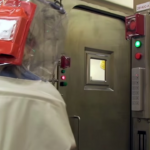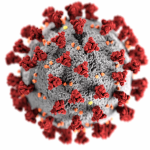When science is lacking, good leadership is critical
By Laura H. Kahn | October 27, 2009
Since the middle of the twentieth century, more than 330 novel infectious diseases have emerged in human populations. The majority of these new diseases spread from animals to humans–take, for example, HIV/AIDS, SARS, and bovine spongiform encephalopathy (commonly known as “mad cow disease,” or BSE). Some political leaders chose to respond to these dangerous diseases by ignoring or downplaying the problem. Others consulted scientific and medical experts in order to make informed decisions to combat the threats. Whichever path a leader chooses, his or her decisions can profoundly impact societal health and well-being.
Unfortunately, there are many instances when political leaders do little or nothing. During the first five years of the HIV/AIDS crisis in the United States, President Ronald Reagan chose to ignore it. In fact, he prevented Surgeon General C. Everett Koop, a distinguished pediatric surgeon at the University of Pennsylvania, from addressing the growing crisis because many conservatives believed that the victims, who were predominantly homosexuals and intravenous drug users, brought the disease upon themselves through their “immoral behavior.” As a result, public education, prevention initiatives, and control programs were delayed, allowing the disease to spread more widely.
In the face of scientific uncertainty, it takes a confident political leader to accept the advice of scientific advisers and develop a sensible response. In the cases of HIV/AIDS and SARS, leaders chose to either ignore or hide the problem. MacGregor’s early responses to BSE, however, were proactive and protected untold numbers of British consumers.”
Delayed decision making also occurred in early 2003 when Chinese leaders waited three months before notifying the World Health Organization (WHO) that SARS had been detected in the country. Even worse, after they finally contacted WHO, they refused offers of assistance from the international public health community. By May, the cumulative number of SARS cases around the world exceeded 8,000. On a positive note, however, China’s obstructionism led to the passage of the stringent 2005 International Health Regulations, which require member states to notify WHO within 48 hours of any threat that qualifies as a public health emergency of international concern.
But it might be the BSE crisis in Britain that most clearly exemplifies the complex challenges that leaders face against novel diseases. Between 1984 and 1996, numerous British leaders had to make difficult policy decisions that had the potential to hurt the country’s agricultural interests and, at the same time, jeopardize public health. And they had to make these decisions without all of the facts. Almost a decade passed before scientists concluded that the causative agent of BSE in cattle could infect humans and cause the human-equivalent Creutzfeldt-Jacob disease (CJD), a rare, fatal neurodegenerative disease typically found in the elderly.
In May 1988 Ministry of Agriculture, Fisheries, and Food (MAFF) officials finally convened an advisory group to assess the possible risks BSE posed to human health. Scientists hypothesized that BSE would behave similarly to scrapie–a disease found in sheep but not transmissible to humans even if the sick sheep were eaten–and likely not pose a threat to human health. Nonetheless, they couldn’t be sure until studies were done assessing disease transmissibility and epidemiological surveillance for new-onset human cases of CJD was carried out.
The advisory group put forth a number of recommendations, but also sought to avoid placing too much pressure on Britain’s agricultural industry. For that reason, it proposed, among other things, that baby food producers should avoid the use of ruminant offal (parts of cattle, such as spinal column, spleen, and thymus, that are not typically consumed by people), but that adult food should only be labeled as containing the animal byproduct so that consumers would be able to make informed choices.
Then MAFF Minister John MacGregor was smart enough to ask the advisory group, “Why just baby food?” He reasoned that if the disease was a potential risk to humans, then it should be banned from all foods regardless of the age of the consumer. In June 1989, he announced a ban on ruminant offal from all human food. His decision removed a potentially massive amount of infectious material from Britain’s food chain and likely saved many lives. In short, he used common sense to make a critical policy decision regarding food safety. More telling is that he was willing to take policy a step further than his advisers recommended.
Because the BSE crisis lasted more than a decade, John MacGregor was just the first of five different MAFF ministers to address the epidemic. Unfortunately, the subsequent ministers were less skilled in applying common sense to the problem. For example, John Gummer, who served as MAFF minister right after MacGregor, decided not to ban mechanically recovered meat that was potentially contaminated. He was swiftly criticized by the press for trying to show that the meat was safe to eat. He even went so far as to force his young daughter to eat a hamburger to prove his point.
By December 2003, 143 people had been diagnosed with definite (autopsy-confirmed) or probable new-onset CJD. These cases were unusual because many were young adults (i.e., the median age was 29 versus 65 for typical CJD sufferers) and deaths occurred much more rapidly after the initial symptoms began than in those with the classic disease. Researchers decided that the disease was distinct enough to coin it “variant CJD” (vCJD) in contrast to classic CJD.
In 1998, Lord Nicholas Addison Phillips, the chief justice of England and Wales, led a public inquiry into the government’s handling of the BSE/vCJD crisis. He concluded, among other things, that government officials had been overly reliant on experts they knew personally. The inquiry also found that the government had taken reasonable, but not timely, measures to prevent the spread of the disease and that for more than a decade it had deceived both the media and the public by insisting that British beef was safe to eat.
In the face of scientific uncertainty, it takes a confident political leader to accept the advice of scientific advisers and develop a sensible response. In the cases of HIV/AIDS and SARS, leaders chose to either ignore or hide the problem. The consequences were severe. In the case of BSE, however, MacGregor’s early responses were proactive and protected untold numbers of British consumers. And Chief Justice Phillips undertook an investigation that finally shed light on the complexities of the crisis.
Although MacGregor’s decisions didn’t prevent the disease’s spread completely, some important lessons can be drawn from the crisis. First, advisory groups provide advice, but they do not make decisions for the leader. MacGregor took the advice from the advisory group and added his own common sense. (Take note: Leadership by committee means that there is no leadership!)
Second, if leaders make decisions by pandering to their constituents’ special interests, then they should be prepared to face the consequences. A recent example comes to mind: During this year’s H1N1 influenza crisis, Egyptian leaders slaughtered thousands of pigs in a misguided attempt to confront swine flu. Unfortunately, that decision has come back to haunt them. Cairo is now buried under piles of rotting organic garbage that would otherwise have been consumed by the pigs.
The bottom line is that all decisions have intended and unintended consequences. We must hope that those in charge have the wherewithal to make decisions in which the benefits outweigh the downsides.
Editor’s Note: This column is drawn from the author’s recently released book, Who’s in Charge? Leadership during Epidemics, Bioterror Attacks, and Other Public Health Crises.
Together, we make the world safer.
The Bulletin elevates expert voices above the noise. But as an independent nonprofit organization, our operations depend on the support of readers like you. Help us continue to deliver quality journalism that holds leaders accountable. Your support of our work at any level is important. In return, we promise our coverage will be understandable, influential, vigilant, solution-oriented, and fair-minded. Together we can make a difference.
Topics: Biosecurity, Columnists














